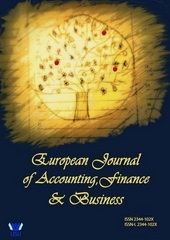|

ISSN: 2344 - 102X
ISSN-L: 2344 - 102X
Our journal is currently indexed in the following databases:
|
| |
Article from Volume 10, Number 3, Year 2022| THE IMPORTANCE OF THE BUDGETING ACTIVITY IN THE DECISION-MAKING PROCESS | 
Download | | Author(s): Camelia - Catalina Mihalciuc, Emanuela Hutanu (trif), Svetlana Mihaila, Maria Grosu | | DOI: 10.4316/EJAFB.2022.1037 | | Abstract: The general management accounting system is now outdated because the information generated by the system arrives too late or too distorted to be relevant to managers' planning and control decisions, moreover, the system is based on simplistic and arbitrary methods and fails to reflect accurate product costs. Entities use managerial accounting techniques, which include both financial and non-financial information, as tools in obtaining useful information throughout the technological processes. By using these methods, the aim is to ensure efficiency in the operations carried out. The present work has as its main objective, the detailed highlighting of the role of cost calculation in the substantiation of managerial decisions, but also of the process of drawing up budgets elaborated at the company level in order to optimize profit and to substantiate optimal decisions. | | Keywords: Costs; Cost Calculation; Management Accounting Practice; Budgets; Managerial Decision | References:
1. Abdel-Kader, M., Luther, R. (2008). The Impact Of Firm Characteristics On Management Accounting Practices: A UK-based Empirical Analysis, The British Accounting Review, 40 (1), 2-27.
2. Ascani, I., Ciccola, R., Chiucchi, M.S. (2021). A Structured Literature Review About The Role Of Management Accountants In Sustainability Accounting And Reporting, Sustainability, 13, 2357.
3. Chapman, C., Kern, A. (2012). Developing Accurate Costing Systems. Working Paper. Imperial College London.
4. Choe, J.M. (2004). The Relationships Among Management Accounting Information, Organizational Learning And Production Performance, The Journal Of Strategic Information Systems, 13 (1), 61-85.
5. CIMA (Chartered Institute Of Management Accountants) (2013). Paper P3: Performance Strategy Study Text; Kaplan Publishing: Berkshire, UK.
6. Cooper, R., Kaplan, R. (1999). Design Of Cost Management Systems: Text And Cases. Prentice Hall.
7. Gichaaga, P.M. (2014). Effects Of MAPs On Financial Performance Of Manufacturing Companies In Kenya. Nairobi: Master Of Science In Finance Dissertation, School Of Business, University Of Nairobi
8. Grosu, V., Anisie, L., Hrubliak, O., Ratsa, A. (2019). Managerial Accounting Solutions: Lean Six Sigma Application In The Woodworking Industry. A Practical Aspec, Economic Annals-XXI, 176 (3-4), 118-130.
9. Ittner, H.D., Larcker, D.F. (1998). Are Nonfinancial Measures Leading Indicators Of Financial Performance An Analysis Of Coustomer Satisfaction, Journal Of Accounting Reasearch, 36, 1-35.
10. Joshi, P.L. (2001). The International Diffusion Of The New Management Accounting Practices:the Case Of India, Journal Of International Accounting, Auditing An Taxation, 10(1), 85-109.
11. Kennerley, M., Neely, A. (2002). A Framework Of The Factors Affecting The Evolution Of Performance Measurement Systems, International Journal Of Operations & Production Management, 22(11), 1222-1245.
12. Klamer, T. (1973). The Association Of Capital Budgeting Tehniques With Firm Performance, The Accounting Review, 48(2), 353-364.
13. Levin, H M, Glass, G V, Meister, G. (1987). A Cost-effectiveness Analysis Of Computer-assisted Instruction, Eval. Rev. 11(l), 50-72.
14. Mihalciuc, C.C. (2015). Organizarea Contabilitatii De Gestiune In Entitatile Economice, Ed. Didactica Si Pedagogica, Bucuresti.
15. Mihalciuc, C.C., Grosu, M. (2019). Instruments Specific To The Process Of Substantiating Managerial Decisions At The Organization’s Level, Balkans JETSS, 2, 194-209.
16. Miller, G.J., Vollmann, E.T. (1985). The Hidden Factory, Harvard Bussines Review. Retrieved December 28, 2021 From: Https://hbr.org/1985/09/the-hidden-factory
17. Nuhu, N.A., Baird, K., Appuhami, R. (2016). The Association Between The Use Of MAPs With Organizational Change And Organizational Performance. In M.J. Epstein & M.A. Malina, Eds. Advances In Management Accounting. Emerald Group Publishing Limited, 67-98.
18. Oyewo, B.M. (2021). Outcomes Of Interaction Between Organizational Characteristics And Management Accounting Practice On Corporate Sustainability: The Global Management Accounting Principles (GMAP) Approach, Sustain. Financ. Investig. 11, 351–385.
19. Talha, M., Raja, J.B., Seetharaman, A. (2010). A New Look At Management Accounting, Journal Of Applied Business Research, 26 (4), 83-96.
20. Tyler, F.T. (2016). Motivating Revisions Of Management Accounting Systems: An Examination Of Organizational Goals And Accounting Feedback, Accounting, Organizations And Society, 53, 1-16.
21. Varani?t?, V., Ži?kut?, I., Žandaravi?i?t?, A. (2022). The Changing Role Of Management Accounting In Product Development: Directions To Digitalization, Sustainability, And Circularity, Sustainability, 14, 4740.
22. Zaporowska, Z.; Szczepa?ski, M. (2022). Exploration Of Lean Management Methods Used In Shared Services Centers, Drivers And Barriers To Process Selection For Improvements In The Light Of Risk Management And ESG Reporting, Sustainability, 14, 4695.
Wouters, M., Roijmans, D. (2011). Using Prototypes To Induce Experimentation And Knowledge Integration In The Development Of Enabling Accounting Information, Contemporary Accounting Research, 28 (2), 708-736.
|
| | Back to journal ... |
|
|
| |
|
|
|

